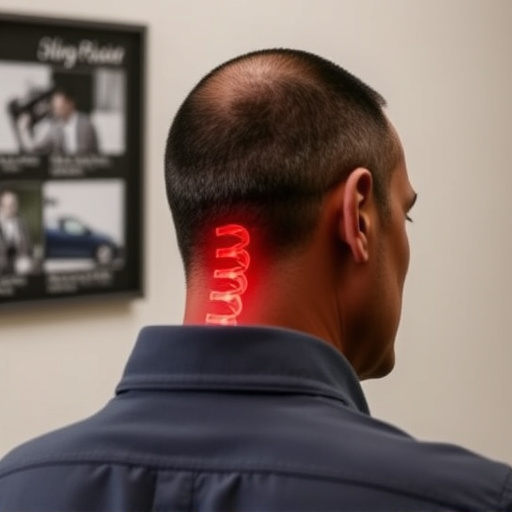Streamlining Government Worker Injury Claims: Expert Care & Process Navigation
In Jacksonville, Florida, government workers injured in auto accidents need to understand their righ…….
Welcome to an in-depth exploration of a specialized healthcare sector that plays a pivotal role in the well-being of federal employees: Federal Workers Comp Chiropractor Jacksonville. This article aims to unravel the intricacies of this field, offering valuable insights for professionals, policymakers, and anyone interested in occupational health and safety. By delving into various aspects, we will uncover the global reach, economic implications, technological innovations, and regulatory frameworks that shape this unique industry.
Federal Workers Compensation (Workers Comp) Chiropractor Jacksonville refers to a specialized healthcare service provided to federal employees who sustain work-related injuries or illnesses. It is a comprehensive program designed to offer medical treatment, rehabilitative care, and financial compensation to affected workers. The core components include:
Medical Care: Chiropractors within this system are trained to diagnose and treat musculoskeletal disorders, back pain, neck strain, and other work-related injuries. They provide non-invasive treatments like adjustments, therapy, and patient education.
Rehabilitation: A significant aspect is helping employees return to work safely. Chiropractors collaborate with physical therapists and other healthcare professionals to develop rehabilitation plans, ensuring workers regain their strength and mobility.
Compensation: The program offers financial support to cover medical expenses and a portion of the employee’s lost wages during recovery. This compensation aims to provide stability while the worker is unable to perform regular duties.
The concept of workers’ compensation has its roots in the late 19th century, with the rise of industrializations leading to more hazardous working conditions. In response, many countries enacted laws to protect workers and ensure they received medical care and financial support if injured on the job. The U.S. Federal Workers Compensation Program was established in 1908, making Jacksonville—a bustling metropolis known for its diverse economy—an integral part of this national effort. Over time, the program has evolved to include advanced treatments and technologies while maintaining its core mission.
Federal Workers Comp Chiropractor Jacksonville is a critical component of the broader occupational health and safety framework. It ensures that federal employees have access to quality healthcare and financial support during times of work-related adversity. This system operates within a vast network of healthcare providers, employers, insurance companies, and government agencies, each playing a unique role in its success.
The impact of Federal Workers Comp Chiropractor Jacksonville extends far beyond Jacksonville’s borders. Many countries worldwide have adopted similar compensation systems, drawing inspiration from the U.S. model. The World Health Organization (WHO) estimates that over 140 countries have some form of workers’ compensation legislation in place, with each nation customizing it to fit their cultural and economic contexts.
Telemedicine Integration: With advancements in technology, telemedicine has become a significant trend, offering remote consultations and treatments for work-related injuries. This approach is especially valuable in rural areas or for employees with limited mobility.
Preventive Care Focus: There is a growing emphasis on preventive measures to reduce work-related injuries. Chiropractors play a vital role in educating workers about ergonomics, posture, and injury prevention strategies.
Digital Record-Keeping: Digitalization of medical records improves efficiency, enables better data analysis, and facilitates seamless communication between healthcare providers and insurance companies.
The implementation of Federal Workers Comp programs varies across regions, influenced by local economic conditions, cultural norms, and political landscapes:
| Region | Notable Features |
|---|---|
| North America | Stricter regulations and higher compensation rates, with a strong emphasis on legal protections for workers’ rights. |
| Europe | Comprehensive coverage with a focus on rehabilitation, ensuring workers can return to the workforce after injuries. |
| Asia-Pacific | Rapid industrialization has led to more stringent safety standards, with governments investing heavily in worker compensation programs. |
| Latin America | Variable implementation, with some countries offering generous benefits while others struggle with underfunding. |
The Federal Workers Comp Chiropractor Jacksonville market operates within a complex ecosystem:
Provider Network: Chiropractors, along with other healthcare professionals, form a network that competes for patients and contracts with insurance companies and government agencies.
Insurance Industry: Insurance providers offer workers’ comp coverage to employers, who in turn pass these costs on to employees through premiums. They also invest in healthcare networks to manage claims effectively.
Government Regulation: Government bodies oversee the program, setting guidelines, and ensuring compliance, while also managing budget allocations.
The economic impact is significant, with investments flowing into:
Healthcare Infrastructure: Upgrading medical facilities, purchasing advanced equipment, and training healthcare professionals to enhance service quality.
Research and Development: Investing in research to develop innovative treatments and technologies for work-related injuries.
Employer Training: Providing resources for employers to implement safety protocols and prevent workplace hazards.
For affected employees, the economic implications include:
Lost Wages: During recovery, workers may experience reduced income due to partial wage replacement provided by the compensation program.
Medical Expenses: Coverage for treatment, medication, and therapy helps reduce financial burdens associated with medical care.
Return-to-Work Incentives: Some programs offer incentives for successful rehabilitation, encouraging employees to return to work sooner.
Chiropractors in this field embrace technological advancements to improve patient outcomes:
Spinal Decompression Therapy: A non-surgical treatment for disc-related issues, offering pain relief and potential regenerative effects.
Laser Therapy: Utilizes low-level lasers to reduce inflammation, speed up healing, and provide pain relief.
Functional Medicine: Focuses on addressing the underlying causes of injuries rather than just managing symptoms.
Electronic Health Records (EHRs): Chiropractors use EHR systems to streamline patient records, improve communication with insurance providers, and enhance data analysis for research purposes.
Telemedicine Platforms: These enable remote consultations, allowing chiropractors to provide care to patients in remote areas or those with limited mobility.
Mobile Apps: Patient education apps offer self-care guidance, exercise routines, and progress tracking to engage workers in their recovery process.
Federal Workers Comp programs operate within a legal framework designed to protect the rights of employees:
Workers’ Compensation Laws: These laws mandate that employers provide compensation for work-related injuries and illnesses, with specific guidelines regarding coverage, benefits, and dispute resolution.
Occupational Safety and Health Standards: Federal and state agencies enforce these standards, ensuring workplaces meet safety requirements to prevent injuries.
Key government bodies involved include:
Department of Labor: Oversees workers’ compensation programs, sets policy guidelines, and manages funding for the program.
Social Security Administration (SSA): In the U.S., the SSA administers disability benefits for workers who cannot return to their previous jobs due to work-related conditions.
Insurance Regulatory Bodies: These agencies monitor insurance companies offering workers’ comp coverage, ensuring fair practices and adequate funding.
Funding Shortages: In some regions, underfunding of workers’ compensation programs poses risks to the quality and accessibility of healthcare services.
Medical Cost Inflation: Rising medical expenses can strain insurance premiums and benefits, impacting both employers and employees.
Technology Integration: While technology offers numerous benefits, successful implementation requires significant investment and training for healthcare providers.
The future of Federal Workers Comp Chiropractor Jacksonville looks promising with several potential developments:
Personalized Medicine: Advancements in chiropractic care may lead to more tailored treatment plans based on individual patient needs and genetics.
AI-Assisted Diagnostics: Artificial Intelligence (AI) can enhance diagnostic accuracy, allowing chiropractors to make more informed decisions.
Global Collaboration: Increased international cooperation could result in the sharing of best practices, research findings, and innovative solutions.
Federal Workers Comp Chiropractor Jacksonville is a vital component of occupational health and safety, ensuring that federal employees receive comprehensive care for work-related injuries. By understanding its history, global impact, economic implications, technological advancements, and regulatory frameworks, we can appreciate the complexity and importance of this field. As technology continues to evolve and global trends shape the sector, the future looks promising for improving worker compensation programs worldwide.

In Jacksonville, Florida, government workers injured in auto accidents need to understand their righ…….

Jacksonville auto accident victims seeking justice and compensation need to understand the importanc…….

In Florida, particularly Jacksonville, understanding government worker injury documentation is cruci…….

Government worker injury documentation is vital for ensuring proper care, compensation, and support…….

Understanding and accurately documenting government worker injuries, especially whiplash cases, is e…….

The St Johns Town Center injury clinic specializes in comprehensive, accurate documentation for gove…….

Government worker injury documentation for neck and back pain relief is a stringent process that inc…….

The St Johns Town Center injury clinic serves as a vital hub for simplifying and ensuring comprehens…….

Government workers injured in Jacksonville auto accidents require meticulous documentation for succe…….